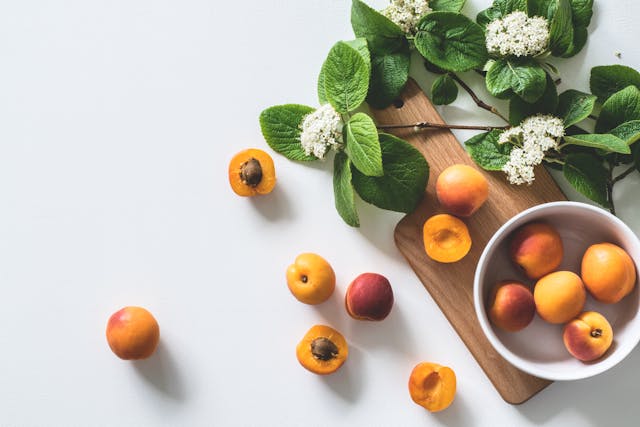
fruits with poisonous seeds
Fruits are often considered the healthiest foods we can consume, filled with vitamins, antioxidants, and fiber. However, lurking beneath the juicy flesh of some fruits are seeds that are surprisingly toxic.
While these fruits are perfectly safe to eat when handled correctly, it’s important to understand the potential dangers hidden inside their seeds.
In this article, we’ll explore several fruits with poisonous seeds and provide practical tips on how to safely enjoy them.
Apples
Apples are a staple in many households, known for their crunchy texture and sweet flavor. However, apple seeds contain a substance called amygdalin, a compound that releases cyanide when metabolized by the body.
Cyanide is a highly poisonous chemical that can cause serious health issues, including respiratory failure and even death in extreme cases.
How dangerous are apple seeds?
You’d have to consume a large quantity of seeds—about 150 or more—to suffer from cyanide poisoning.
The seeds’ tough coating also makes it difficult for the body to digest them fully, reducing the immediate danger. Nonetheless, it’s best to avoid eating apple seeds altogether.
Tip:
When preparing apples, especially for children, remove the core and seeds to ensure safe consumption.
Cherries
Cherries are delicious, but their pits contain hydrogen cyanide, a form of cyanide similar to that found in apple seeds. The toxic chemical is contained within the hard pit, and if accidentally cracked or chewed, it could release cyanide.
How dangerous are cherry pits?
If you accidentally swallow a cherry pit whole, there’s usually no need for concern, as it will likely pass through your digestive system without causing harm.
However, chewing or crushing the pit can expose you to cyanide. Swallowing several broken pits could lead to poisoning symptoms like dizziness, nausea, and vomiting.
Tip:
When enjoying cherries, carefully discard the pits to avoid accidental consumption.
Peaches
Like cherries, peaches belong to the same family of stone fruits (Prunus genus), and their pits also contain amygdalin, which releases cyanide upon digestion. While the fleshy part of the peach is nutritious, the pit should never be consumed.
How dangerous are peach pits?
Much like cherry pits, peach pits need to be crushed or broken for their toxins to pose a threat. Swallowing an intact pit is generally not harmful, but it’s wise to avoid chewing on them.
Tip:
Peach pit removal tools can help prevent any accidental consumption of the seeds while you enjoy the sweet flesh.
Apricots
Apricots, another member of the stone fruit family, also have seeds that contain amygdalin. Apricot kernels (seeds) are sometimes consumed in small amounts as they are believed to have medicinal benefits in some cultures. However, consuming apricot kernels in large quantities can lead to cyanide poisoning.
How dangerous are apricot kernels?
A few kernels might not cause immediate harm, but consuming them in larger amounts can be toxic. The European Food Safety Authority (EFSA) warns that eating just three small apricot kernels can exceed safe levels of cyanide for adults, while smaller amounts can be dangerous for children.
Tip:
Always avoid apricot seeds or kernels unless specifically processed to remove the amygdalin.
Plums
Plums are another stone fruit whose pits are best left uneaten. Plum seeds contain amygdalin, similar to the other fruits in this family. If ingested, they can cause cyanide poisoning, though you’d need to chew or break the pits to be at serious risk.
How dangerous are plum pits?
As with cherries, peaches, and apricots, swallowing a whole pit won’t necessarily harm you, but chewing it could release toxic chemicals. To stay safe, always remove the pit before eating or using plums in recipes.
Tip:
When cooking or baking with plums, always pit the fruit in advance.
Elderberries
Elderberries are well-known for their immune-boosting properties, often used in syrups and supplements. However, the seeds, leaves, and unripe berries of the elderberry plant contain cyanogenic glycosides, which can release cyanide when consumed.
How dangerous are elderberries?
If improperly prepared, elderberries can cause nausea, vomiting, and diarrhea. It’s crucial to cook elderberries thoroughly before consuming them to break down the toxic compounds.
Tip:
Never eat raw elderberries or their seeds. Cooking them thoroughly neutralizes the toxins and makes them safe to enjoy.
In Conclusion
While the fruits mentioned above are nutritious and delicious, their seeds contain poisonous compounds that can pose serious health risks if consumed in large quantities or improperly prepared.
The good news is that most people are unlikely to experience poisoning because they avoid chewing or swallowing large quantities of seeds and pits. However, it’s always wise to exercise caution and remove seeds and pits before eating these fruits.
For safe consumption:
- Always discard the seeds or pits of apples, cherries, peaches, apricots, and plums.
- Cook elderberries thoroughly to neutralize any toxins.
By following these tips, you can continue to enjoy these fruits without worry!






